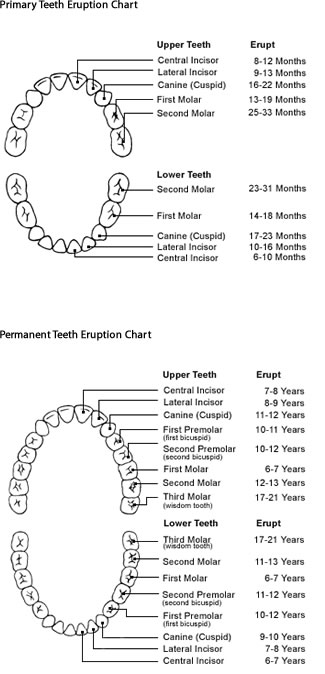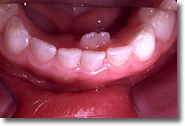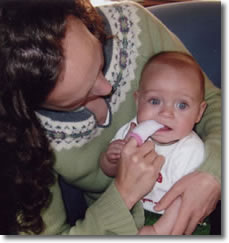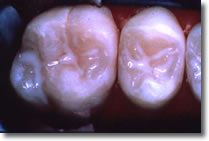Raymond Ramos DDS
-
If your child has an accident that involves the teeth, please call the office ASAP.
-
You may also go to The Dental Trauma Guide website for Trauma Helpful Hints.
Why are baby teeth so important?
The most important role of primary teeth is they lead to the formation of the permanent teeth. In addition, they help your child learn to form proper speech sounds, chew and smile. Since primary teeth are present in the child’s mouth for up to 13 years, it is very important to care for these teeth just as you would permanent teeth. Cavity causing bacteria can be transformed from caregivers to their children, so it is equally important for parents to brush and floss routinely and have regular dental exams. This also sets a good example for young children to follow. Below is a chart of the time line for eruption of primary and permanent teeth.

What should you do if a tooth is chipped, broken or knocked out?
If your child has an emergency involving a permanent or primary (baby) tooth, call our office at (707) 544-4611 or after hours our answering service (707) 776-8094. Please be prepared to describe the nature of the accident, the teeth involved and symptoms child may be having. I feel it is best to see a dentist as soon as possible so he/she can evaluate the situation.
What if a permanent tooth is growing behind or above a primary (baby) tooth?
Very often when young children are losing primary (baby) teeth and getting new permanent teeth there may be a time where both teeth are present at the same time. This may occur either behind the lower teeth or on top of the upper teeth. For best results, the child must wiggle the primary (baby) tooth on a consistent basis until the baby tooth has left the mouth, then the permanent tooth can move forward, replacing where the primary tooth was.
A wise man once said, “Have you ever seen an adult with 2 rows of teeth”?
The answer of course is NO. The primary teeth will eventually come out on their own if left alone.
What should parents know about dental Hygiene?
Cavity causing bacteria can be transmitted from caregivers to their children, so it equally important for parents to brush and floss routinely and have regular dental exams. This also sets a good example for your children to follow.
How do I brush my infant’s teeth?
 Wipe an infant’s toothless gums with a soft washcloth
to keep the mouth clean. Begin brushing once the first tooth pushes through
the gums. Use a soft or extra-soft toothbrush to clean teeth at least
twice daily, every morning and before bedtime. Two minutes of brushing
is a good time to aim for after all primary teeth have erupted. Children
need a little coaxing. Try a timer or play a favorite two-minute song
for encouragement.
Wipe an infant’s toothless gums with a soft washcloth
to keep the mouth clean. Begin brushing once the first tooth pushes through
the gums. Use a soft or extra-soft toothbrush to clean teeth at least
twice daily, every morning and before bedtime. Two minutes of brushing
is a good time to aim for after all primary teeth have erupted. Children
need a little coaxing. Try a timer or play a favorite two-minute song
for encouragement.
Nighttime brushing is most important because it leaves the mouth clean during 8 – 12 hours of sleep. After brushing at bedtime no snacks should follow. Because young children lack the dexterity to effectively reach all areas of their mouths parents should assist with brushing until age 8.
How much toothpaste do I need to use?
Use fluoridated toothpaste when your child can spit out and not swallow the toothpaste. Use only a pea-size amount on the brush. Do not rinse with water after brushing; have your child spit, and then let the residual toothpaste remain on the teeth.

Do I need to floss my child's teeth?
If you can see the teeth touching a parent needs to floss the child’s teeth to remove impacted food. If you can see gums between teeth there is no need to floss yet.
How do I maintain a healthy, nutritional diet?
 Maintain a balanced diet. Serve healthy snacks such
as raw fruits and vegetables, milk, nuts, yogurt, eggs and cheese.
Maintain a balanced diet. Serve healthy snacks such
as raw fruits and vegetables, milk, nuts, yogurt, eggs and cheese.
Drink water often. Avoid fruit roll-ups, chewy fruit snacks and candy; all of which stick to teeth and are hard to clean off. Check labels on prepared food packages, cans bottles.
Sugars added to food can be listed as: Glucose, sucrose, dextrose, lactose, natural sweetners, corn syrup, honey, molasses among other terms. Milk, without flavorings added, strengthens teeth and bones; serve at meal or snack time but don’t put youngsters to bed sipping it.
Which beverages are good?
Our favorite choice is milk at meals and water between meals and at bedtime. Sodas are our least favorite drinks. They contain sugar (up to 10 teaspoons in a 1oz. drink) and acid, both of which weaken teeth. Juices and sports drinks can also be high in sugar. Read labels. Strictly limit your child’s consumption, reserving high sugar drinks for special occasions.
What is Xylitol?
This natural sweetener does not cause cavities and actually can help prevent them. It is a non-fermentable sugar that stops the acid onslaught that can lead to cavities. Xylitol also increases saliva production which can protect your teeth. If a child is old enough and you allow gum-chewing look for gum or other products including mints, tooth wipes and toothpaste containing Xylitol.

Why do teeth need sealants?
Dental sealants are a plastic coating applied to molars to fill deep grooves where food and bacteria that cause cavities get caught. Sealants make teeth less prone to developing cavities.
How can parents help?
Let your children see you brushing and flossing your teeth regularly; make it a fun practice to do together. Praise your child for good oral hygiene habits. Drink and eat what you want your children to consume. Be consistent. Set routines and stick to them. Don’t stock unhealthy snacks at home. Limit sweet treats. Get in the habit of drinking plain water.
What causes cavities or “ECC”?
 Dental decay, “cavities”, is a multi functional process involving bacteria, diet, and oral hygiene. All three of these functions play a role in the growth of decay in the mouth.
Dental decay, “cavities”, is a multi functional process involving bacteria, diet, and oral hygiene. All three of these functions play a role in the growth of decay in the mouth.
ECC or Early Childhood Caries describes cavities that may develop on the upper front teeth when young children are still drinking liquid from a bottle or breast. For early prevention of ECC we suggest keeping the teeth clean of any food or liquid.
Why does my child grind his/her teeth?
No one really knows why children grind in their sleep, but it is one of the most common childhood habits. Parents will notice worn or "flat" areas on the molors and cuspids if the grindings persists. As long as this wear is confined to the primary teeth we do not recommend any intervention. When the permanent teeth are affected a night guard is helpful.